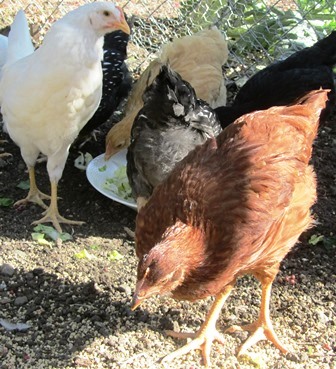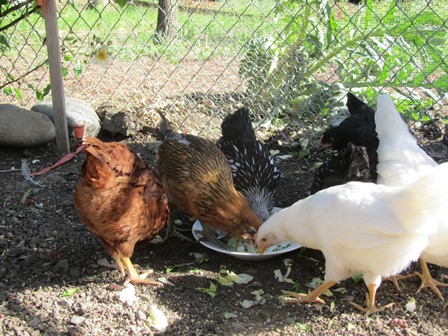Rainy Day Projects on the Farmette
I awoke in the pre-dawn hours to the sound of soft pattering of rain beyond my bedroom window. The birds twittered away in the pepper tree . I rolled over to listen and said a prayer of thanks that the “storm door” has finally opened. Three storms are expected to hit our drought-stricken California during this first full week of 2016.

There’s always plenty of action at the feeder when the finches discover it has been filled with Nyjer seed–high in calories and oil content.
After I had swallowed a half cup of morning coffee, I headed out to the feed store to buy chicken crumble, scratch grains, and some seed and suet to hang for the birds.

A male Nuttall’s Woodpecker loves dining on the suet cake; he hangs around all year near our pepper tree.
I won’t continue the pruning of the pomegranates and apricots that I started on Sunday. I’ll wait until we have a dry day for that. But I will continue to apply the plaster to the drywall that we’ve hung in the as-yet-unfinished small bedroom destined to become my office. That will be a perfect rainy day activity. And when I finish, I’ll go back to work on my newest mystery.
For more vignettes of farmette life, check out A Beeline to Murder, the first novel in the Henny Penny Farmette series of cozy mysteries. It’s available online and from brick-and-mortar bookstores everywhere. See, http://tinyurl.com/p8d6owd
Consider This Before You Get Backyard Chickens
My bedroom window faces the back of our property where the chicken coop sits. Every morning, I’m awakened by repeated grauwkkkk sounds made by the Silver Laced Wyandottes and the Rhode Island Red hens, the noisiest ones of all my chickens.
I wish I’d read up more on the breeds before making my selections at the feed store. I love keeping chickens and the eggs are fabulous. That said, there are some of the areas I wish I’d known more about. I might have chosen different breeds.

Rhode Island Red hen seems to be at the top of the pecking order in this small flock of backyard chickens
1. Noisemakers–some breeds are noisier than others. I seldom hear the occasional cluck from my White Leghorns, but the Wyandottes never seem to shut up. Get a bunch of hens together and conversing, and you’ll soon see what I mean.
2. Snacking–chickens love snacks but give them judiciously. If they consume too many treats like blueberries, fresh corn from the cob, and bits of bread or rice, the quality of their eggs may suffer. But as soon as you give them treats, they become your best friends and will follow you around.
3. Pecking–chickens quickly establish a pecking order; they will also peck you . . . some harder and more aggressively than others. My Black Sex Link hen just seems kind of mean and pecks with impatience. But the Rhode Island Red will give an almost loving peck that’s not hard and doesn’t hurt.
4. Broodiness–when a hen goes broody (like my Wyandotte and Buff Orpington hens), her hormones have told her she needs to sit on a clutch of eggs until they hatch (about three weeks). But if you do not have a rooster to have fertilized those eggs, the hen will sit on them anyway, tying up a nesting box and hoarding eggs that will have to be tossed out when she finally figures out that she’s engaged in a futile pursuit of baby chicks. Some breeds tend to broodiness more than others.
5. Water and Food–chickens need water, love crumble, and can benefit from a serving of cracked grains and dried worms. To ensure their egg shells are sufficiently rigid, they may also need additional oyster shell calcium. And like all living beings they need fresh water. If they go without water, they can stop laying for weeks. I’ve figured out the cracked grains must be so tasty they are like cotton candy and after them, the hens don’t want their good food.
6. Diminishing Returns–hens begin laying when they are about five months old. After the first year, egg production will fall off about 20 percent in subsequent years. They generally lay eggs for seven or eight years, but can live to be older and produce no eggs.
7. Egg size–when a hen tries to lay too large of an egg, it can cause a condition called cloaca prolapse. It can claim her life–I’ve lost two chickens to this problem. One was an Ameraucana heritage chicken that laid blue-green eggs. I do miss her as she was skittish but quiet.
8. Moving Hens or a Rooster–if you are getting the gift of a chicken from a neighbor or friend, move that chicken into the flock at night. When he or she wakes up in the morning, the whole event will be a fait accompli and will generate less stress for all involved.
 Facebook
Facebook Goodreads
Goodreads LinkedIn
LinkedIn Meera Lester
Meera Lester Twitter
Twitter






